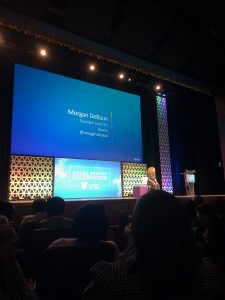At the Grace Hopper session, I appreciate how personalized that you can make your experience here based on your passions and interests. I attended various sessions to explore my interest in how technologies can advance the healthcare field.
In one of my sessions I attended, it discussed how deep learning can assist with metastatic cancer detection. I enjoyed learning the research how through image net classification can be continually trained to detect whether the cancer is benign or malignant. It was inspiring to see that machine learning can even be more of a powerful source because the computer can rotate the data to get more data points and can average out all predictions. I was amazed on the potential of classification because effective and efficient classification of cancer is vital for treatment.
Another interesting session that I attended was about busting bias in machine learning for cancer research. The pressing problems that the research presented was that clinical trials to test cancer research is slow and expensive, and is not representative of the total population. The research promotes the use of electronic medical records as a great source of data. My favorite point of the talk was the reminder that machine learning is a tool, not a product, so we must remind ourselves to stay grounded on the central reason of why we are using machine learning. This research allowed me to think of technologies in a more holistic approach because with technologies, there will also be obstacles. In this case, machine learning can systemically make errors, also known as bias. The speaker offered strategies to mitigate bias such as continuing to test the technology tools to ensure reliability.
Cristalle Choi


